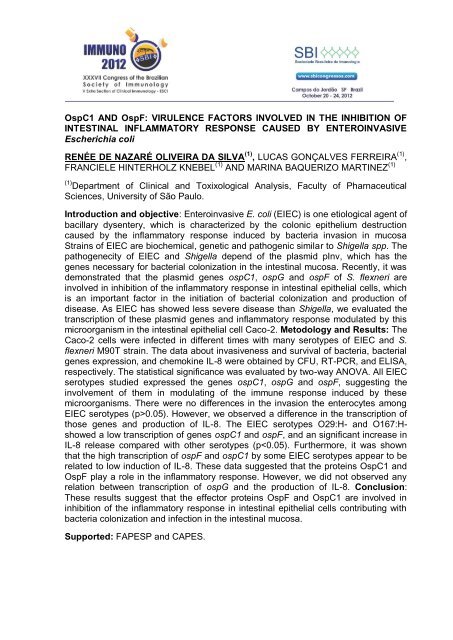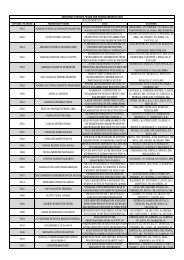immunology of infectious and parasitic diseases - XXXVII Congress ...
immunology of infectious and parasitic diseases - XXXVII Congress ...
immunology of infectious and parasitic diseases - XXXVII Congress ...
Create successful ePaper yourself
Turn your PDF publications into a flip-book with our unique Google optimized e-Paper software.
OspC1 AND OspF: VIRULENCE FACTORS INVOLVED IN THE INHIBITION OF<br />
INTESTINAL INFLAMMATORY RESPONSE CAUSED BY ENTEROINVASIVE<br />
Escherichia coli<br />
RENÉE DE NAZARÉ OLIVEIRA DA SILVA (1) , LUCAS GONÇALVES FERREIRA (1) ,<br />
FRANCIELE HINTERHOLZ KNEBEL (1) AND MARINA BAQUERIZO MARTINEZ (1)<br />
(1) Department <strong>of</strong> Clinical <strong>and</strong> Toxixological Analysis, Faculty <strong>of</strong> Pharnaceutical<br />
Sciences, University <strong>of</strong> São Paulo.<br />
Introduction <strong>and</strong> objective: Enteroinvasive E. coli (EIEC) is one etiological agent <strong>of</strong><br />
bacillary dysentery, which is characterized by the colonic epithelium destruction<br />
caused by the inflammatory response induced by bacteria invasion in mucosa<br />
Strains <strong>of</strong> EIEC are biochemical, genetic <strong>and</strong> pathogenic similar to Shigella spp. The<br />
pathogenecity <strong>of</strong> EIEC <strong>and</strong> Shigella depend <strong>of</strong> the plasmid pInv, which has the<br />
genes necessary for bacterial colonization in the intestinal mucosa. Recently, it was<br />
demonstrated that the plasmid genes ospC1, ospG <strong>and</strong> ospF <strong>of</strong> S. flexneri are<br />
involved in inhibition <strong>of</strong> the inflammatory response in intestinal epithelial cells, which<br />
is an important factor in the initiation <strong>of</strong> bacterial colonization <strong>and</strong> production <strong>of</strong><br />
disease. As EIEC has showed less severe disease than Shigella, we evaluated the<br />
transcription <strong>of</strong> these plasmid genes <strong>and</strong> inflammatory response modulated by this<br />
microorganism in the intestinal epithelial cell Caco-2. Metodology <strong>and</strong> Results: The<br />
Caco-2 cells were infected in different times with many serotypes <strong>of</strong> EIEC <strong>and</strong> S.<br />
flexneri M90T strain. The data about invasiveness <strong>and</strong> survival <strong>of</strong> bacteria, bacterial<br />
genes expression, <strong>and</strong> chemokine IL-8 were obtained by CFU, RT-PCR, <strong>and</strong> ELISA,<br />
respectively. The statistical significance was evaluated by two-way ANOVA. All EIEC<br />
serotypes studied expressed the genes ospC1, ospG <strong>and</strong> ospF, suggesting the<br />
involvement <strong>of</strong> them in modulating <strong>of</strong> the immune response induced by these<br />
microorganisms. There were no differences in the invasion the enterocytes among<br />
EIEC serotypes (p>0.05). However, we observed a difference in the transcription <strong>of</strong><br />
those genes <strong>and</strong> production <strong>of</strong> IL-8. The EIEC serotypes O29:H- <strong>and</strong> O167:H-<br />
showed a low transcription <strong>of</strong> genes ospC1 <strong>and</strong> ospF, <strong>and</strong> an significant increase in<br />
IL-8 release compared with other serotypes (p



